They died in buried cellars, on smoky barricades and in smelly sewers. For Poles, they are heroes. But what did their opponents think of the Columbus generation? What was the opinion of the Germans about the Warsaw insurgents?
Thousands of memoirs of Home Army soldiers have been published. They show the image of the Germans suppressing the uprising:brutal, devoid of feelings, but also generous and compassionate. The main thing that remained in the collective consciousness was the figures of Dirlewanger's murderers, splitting the heads of children and raping nuns. And what memories are saved in the memory of the torturers?
It is hard to find a better source of knowledge on this subject than the book by Hans von Krannhals. The first German publication devoted to the Warsaw Uprising. It was originally published in 1962, after which it was reprinted twice. Only now, however, was it published in Polish - as Warsaw Uprising 1944 (Bellona 2017).
In the summer of 1944, Warsaw was in the area of responsibility of the German 9th Army, commanded by General Nikolaus von Vormann. It was his subordinates who clashed with the soldiers of the Home Army. With soldiers they didn't know anything about at first.
In the first report, sent to Martin Borman, Hitler's secretary, the Warsaw party unit reported that "several police offices were attacked and the post office was surrounded" . Party activists thought that "for now it is about communist insurgents because they are wearing red armbands".
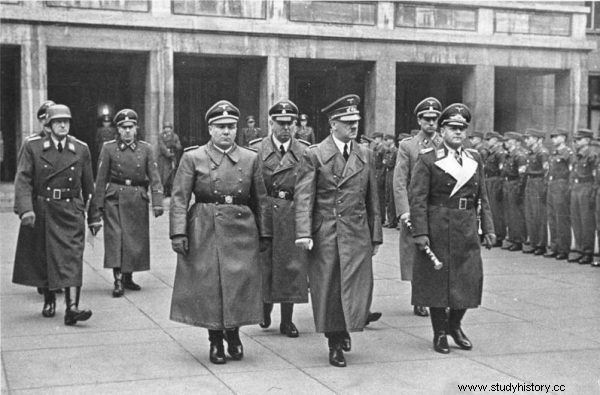
In a report to Hitler's secretary Martin Bormann (in the foreground left), the Warsaw unit of the NSDAP reported that the uprising was caused by ... communists.
The organization was clearly failing. It was only improved by the arrival of Erich von dem Bach-Zelewski, who became the commander of the Korpuśna Group, which was to pacify the uprising. He wrote in an account drawn up in February 1947:
Since the network of Security Police agents was not functioning, I was initially doomed only to reconnaissance by battle groups. It was easy to see that the enemy had a small amount of heavy weapons at his disposal. However, we have never found out that the enemy suffers from a shortage of ammunition for light infantry weapons. (…)
Because the reconnaissance reports of the 9th Army did not provide answers to the most important issues, such as enemy command, division into units, formation of enemy gravity points, assessment of the enemy's position and the number of Polish soldiers, I myself used a few Polish-speaking Volksdeutsche as intelligence agents in Warsaw. I gave them an order to use the way of the insurgents, namely the sewer system, as food smugglers.
These scouts returned with great results: they gave me the name of my main opponent - Bor-Komorowski , I also found out that in addition to A.K. there are also pro-Russian insurgent groups that seem to be retaining a certain independence.
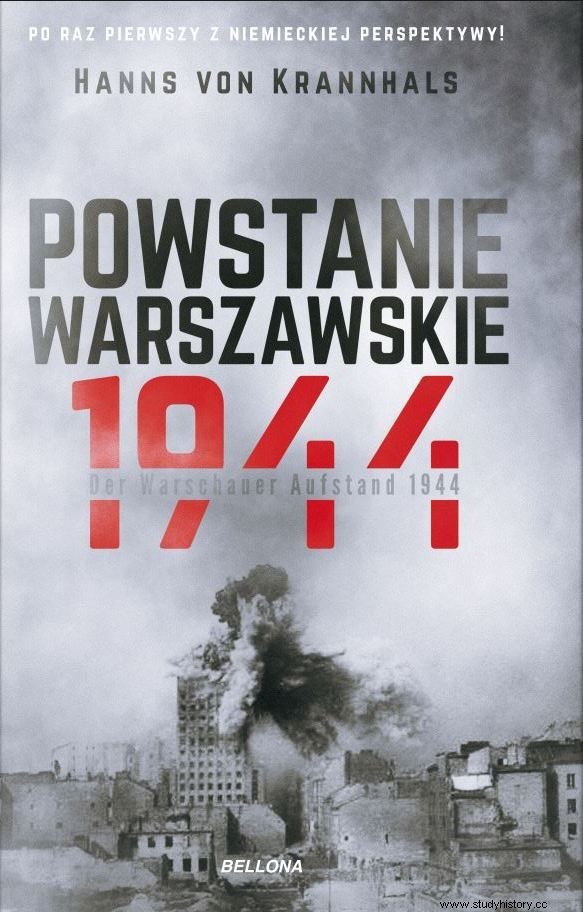
The article was inspired by Hanns von Krannhals' book "Powstanie Warszawskie 1944" (Bellona 2017).
With the passage of time and with subsequent fights, the Germans got to know their opponent better and better. This applied primarily to ordinary soldiers on the front lines. It was mainly from them that the intelligence took its knowledge. Very few prisoners were taken, and those insurgents who were captured were shot on the spot.
Fight in the city
In the first days of the uprising, the German staff officers did not have much information. However, they noticed that Polish soldiers learn very quickly and fight with extraordinary dedication. Many reports repeatedly mention frequent changes of tactics, innovative methods of fighting in the city and iron discipline. The Germans were impressed by the adaptability and skills of the insurgents. On August 2, General Lt. Reiner Stahel, the military commander of Warsaw reported to the command of the 9th Army:
The enemy's tactic is to attack first smaller, then bigger and bigger resistance points and destroy them. Currently, the post office building was attacked so heavily with mortars, mines and hand grenades that both side wings had to be surrendered. The well-trained and well-armed besieging the resistance points became so strengthened that during the vigorous attack of the enemy against the resistance point, even tanks could not come to the rescue from the outside.

The German command was impressed by the combat ability of the soldiers of the Home Army. The photo shows an insurgent office on the premises of the Main Post Office.
This morning, some but very limited traffic of German vehicles on the streets was still possible, which means that the well-organized and trained enemy troops on the one hand are not strong enough to block the entire city, but on the other hand, they have such an advantage that it is possible to liberate the city only with the use of large, imported troops.
In the following days, the Germans realized with horror that the actions of the Home Army were planned and carried out in accordance with all the rules of military craftsmanship. On August 9, General Vormann complained in the teletype addressed to the High Command of Army Group "Center":
The uprising in Warsaw intensifies. The initially improvised uprising is now strictly military. In the near future it is impossible to suppress the uprising with the forces at our disposal. There is a growing danger that this movement will attract wider circles and even sweep the whole country.
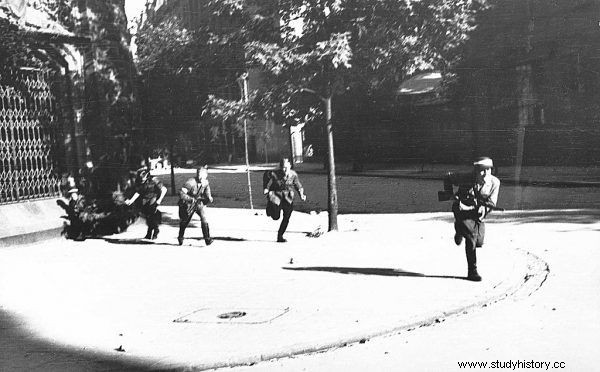
Genera von Vormann quickly realized that he had underestimated the insurgents. The photo shows the soldiers of the "Koszta" Company during the attack on the "Esplanada" restaurant.
On the first line
Not only the insurgents did not want to fall into the hands of the enemy. German rank-and-file soldiers were also afraid of being captured. They believed that while "the older [age] officers behaved in a chivalrous manner, the younger ones were eager for revenge." It was related to the events that took place in Wola in the first week of the uprising. That is why people fought to the death in narrow corridors, staircases and in musty cellars.
“We followed the Poles into a house. There were three of us. We on the ground floor, the Poles attacked from the upper floors and the basement, ”recalled Mathias Schenk, a sapper who fought in Warsaw after the war. - “We smoked various appliances in the room all night to see a bit. We fought with bayonets every now and then. At dawn I saw that the two of us stayed, the third friend was lying with his throat cut. There were bodies in every room. A sniper was firing from the roof of the house opposite. We hit him, he fell down and caught his leg on the beams. He hung upside down. He was alive for a long time. ”
The snipers took their toll on the German soldiers, who emphasized the skills and cunning of Polish shooters.
"We always went ahead" - remembered Schenk - "and the Poles do not know where, from nowhere they will shoot. The ball will light and fly to the sky. However, we quickly learned from clever Poles how to hide. They could shoot from under a slightly raised tile ”.
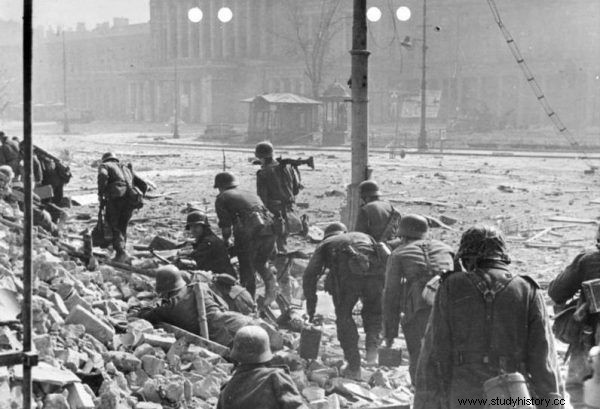
German soldiers felt a real respect for Polish sharpshooters.
These extraordinary skills were also noticed by German intelligence. The instruction on the tactics of the fight of the insurgents in Warsaw reads:
As time passed, the enemy adapted his fighting tactics to our fighting methods. Whereas in the first days the insurgents, who, actually mainly during attacks by infantry, systematically shot at the Germans whenever they showed themselves to you, now the enemy allows the attacking groups (...) to get close to a certain place to destroy them with the help of well-directed fire from sharpshooters Soldiers and wounded returning from the attacks report that the fatalities are caused almost only by headshots.
An injured man observed how in one place with a notary sign on the wall at head height, many comrades were hit, every time they found themselves at the height of the signboard. He concluded that the machine gun must be aimed at this exact spot. The direction from which the shots were fired was unnoticeable despite careful observation and searches with binoculars.
The loopholes were half a brick in size and were generally difficult to see. Even at night no flare of fire was seen and only a faint roar was heard. .
Stubborn and stubborn
In the reports of the 9th Army, apart from cunning, adaptation skills and courage, they emphasized the stubbornness and tenacity of the insurgents.
In the second week of the uprising, staff officers reported that “the enemy's resistance is still fierce. The insurgents are fighting stubbornly and fiercely and are focused on fighting only well-located targets. "
In a secret instruction, issued on August 21, it was written:“Polish bandits in Warsaw are fighting fanatically and fiercely. Own successes achieved after three weeks of fighting are, despite the support of numerous, state-of-the-art weapons, slim.
This is confirmed by the memories of Schenk, who survived 19 fights with bayonets, shovels and bare hands. Poles could not even be chased away by fire:“Through the window I was throwing lighting bottles with gasoline in the direction of the neighboring cinema. A house thrown with such bottles usually burst into flames. I thought we puffed out the Poles, but they kept shooting and throwing grenades. ”
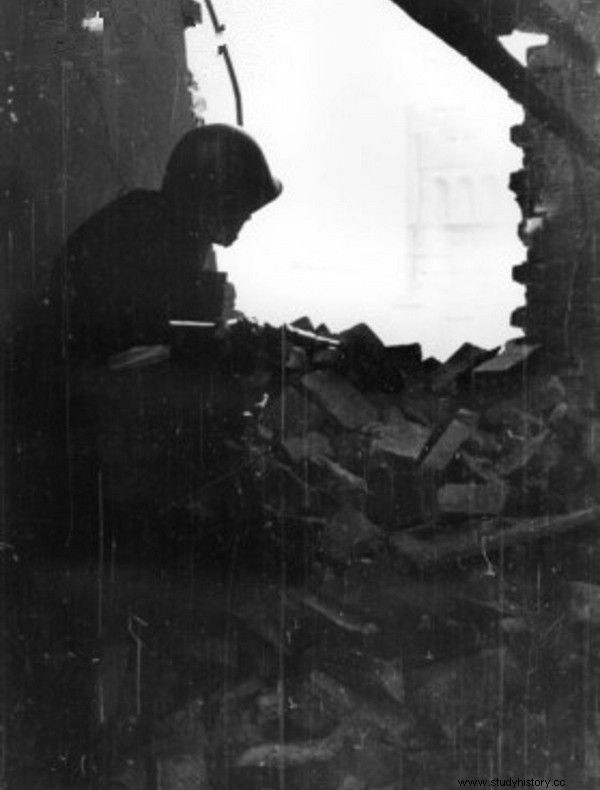
German soldiers were impressed by the determination with which the insurgents fought.
Truth and propaganda
Unflattering opinions about the insurgents were repeated in official letters. The German press wrote about bandits, villains, their tactical abilities and skills were questioned. A completely different picture emerges from the reports sent by the staff officers of the 9th Army and Bach-Zalewski's group. The secret documents emphasized the courage, cunning and tactical maturity of Polish soldiers.
First of all, the Germans were surprised by the extraordinary courage and dedication of the Poles. In the headquarters of the Oberkommando des Heeres it was noted that "The insurgents are fighting to the last".
